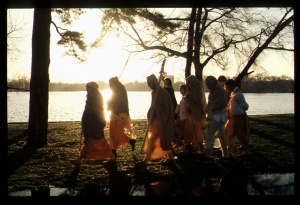SB 1.3.4 (1962)

A.C. Bhaktivedanta Swami Prabhupada
TEXT No. 4
Pasyanti adah adabhra chakshusa Sahasrapado uru bhujanana adbhutam Sahasra murdha shravana akshi nasikam Sahasra moulya ambara kundala ullasat
ENGLISH SYNONYMS
Pasyanti—see, Adah—the form of the Purusha, Adabhra—perfect, Chaksusa—by the eyes, Sahasrapada—thousands of legs, Uru—thighs, Bhujanana—hands and faces, Adbhutam—wonderful, Sahasra—thousands of, Murdha—heads, Shravan—ears, Akshi—eyes, Nasikam—noses, Sahasra—thousands, Moulya—garlands, Ambara—dress, Kundala—earring, Ullasat—all glowing.
TRANSLATION
The devotees with their perfect eyes do see the transcendental Form of the Purusha Who have thousands of legs, thighs, arms, and faces all extraordinary. In that body there are thousands of heads ears, eyes and noses. They are decorated with thousands of helmets dressed in garlands and glowing earrings.
PURPORT
With our present materialised senses we cannot perceive anything about the transcendental Lord. Our present senses are to be rectified by the process of devotional service when the Lord becomes Himself revealed to us. In the Bhagwat Geeta it is confirmed that the transcendental Lord can be perceived only by pure devotional service. So it is confirmed in the Vedas that devotional service only can lead one to the side of the Lord and devotional service only can show Him. In the Brahma Samhita also it is said that the Lord is always visible to the devotees whose eyes have been anointed with the tinge of devotional service. So we have to take information of the transcendental form of the Lord from persons who have actually seen Him in perfect eyes smeared with devotional service. In the material world also we do not always see things in our own eyes but we perceive it through the experience of them who have actually seen or done things. If that is the process for experiencing a mundane object it is more perfectly applicable in the matters transcendental. So with patience and perseverance only we can realise the transcendental subject matter regarding the Absolute Truth and His different Forms. He is formless to the neophytes but He is in transcendental Form for the expert servitor.